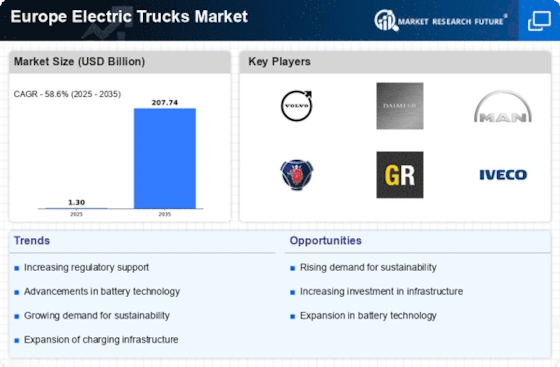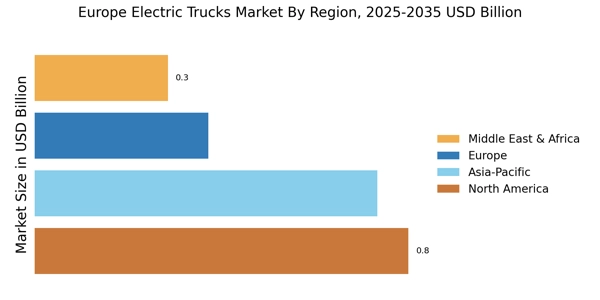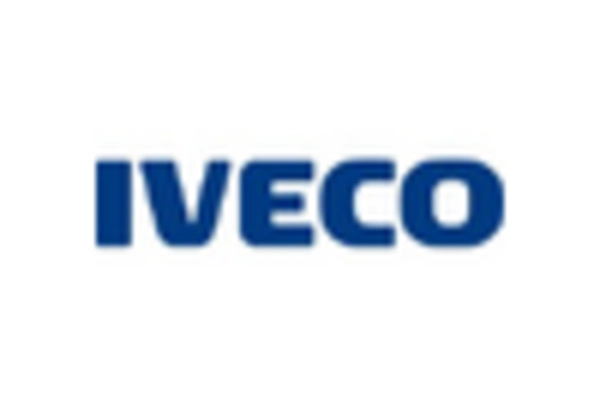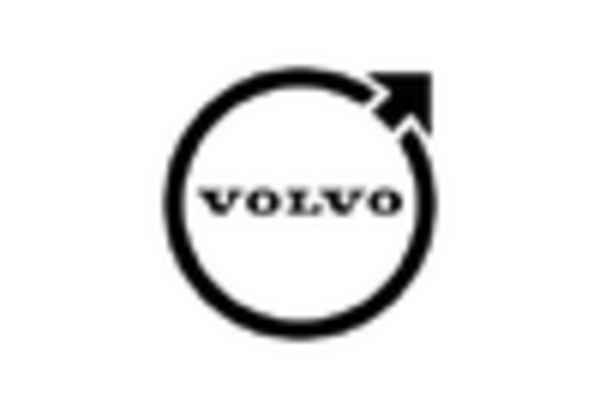Regulatory Support and Incentives
The Europe Electric Trucks Market is experiencing a surge in growth due to robust regulatory support and incentives from various governments. Many European nations have implemented stringent emissions regulations, compelling logistics companies to transition to electric trucks. For instance, the European Union has set ambitious targets to reduce greenhouse gas emissions by at least 55% by 2030. This regulatory framework not only encourages manufacturers to innovate but also provides financial incentives for fleet operators to adopt electric vehicles. As a result, the market is projected to grow significantly, with estimates suggesting a compound annual growth rate of over 20% in the coming years. Such supportive policies are likely to create a favorable environment for the Europe Electric Trucks Market, driving demand and adoption across the region.
Investment in Charging Infrastructure
Investment in charging infrastructure is a critical driver for the Europe Electric Trucks Market. The expansion of charging networks is essential to support the growing number of electric trucks on the roads. Governments and private entities are increasingly investing in fast-charging stations and depot charging solutions to facilitate the transition to electric fleets. Recent reports indicate that the number of public charging points in Europe has increased significantly, with projections suggesting a need for over 1 million charging points by 2030 to meet the demand from electric vehicles. This infrastructure development not only alleviates range anxiety among fleet operators but also enhances the operational efficiency of electric trucks. As charging infrastructure continues to expand, it is likely to bolster the growth of the Europe Electric Trucks Market, making electric trucks a more viable option for logistics companies.
Rising Fuel Prices and Operational Costs
Rising fuel prices and operational costs are compelling logistics companies to consider electric trucks as a viable alternative, thereby driving the Europe Electric Trucks Market. Fluctuating oil prices have made traditional diesel fuel increasingly expensive, prompting fleet operators to seek more cost-effective solutions. Electric trucks, with their lower energy costs and reduced maintenance requirements, present an attractive option for companies looking to optimize their operational expenses. Data suggests that electric trucks can offer savings of up to 30% in fuel costs compared to diesel trucks. As the total cost of ownership becomes more favorable, the transition to electric trucks is likely to accelerate. This economic pressure, combined with the potential for long-term savings, is expected to significantly influence the growth trajectory of the Europe Electric Trucks Market, as more companies adopt electric solutions to enhance their competitiveness.
Environmental Concerns and Sustainability Goals
Environmental concerns and sustainability goals are increasingly influencing the Europe Electric Trucks Market. As climate change becomes a pressing global issue, many companies are prioritizing sustainability in their operations. The logistics sector, in particular, is under pressure to reduce its carbon footprint, leading to a shift towards electric trucks. Research indicates that electric trucks can reduce greenhouse gas emissions by up to 70% compared to their diesel counterparts. This shift aligns with the European Union's Green Deal, which aims to make Europe the first climate-neutral continent by 2050. Consequently, businesses are more inclined to invest in electric trucks as part of their sustainability strategies. This growing emphasis on environmental responsibility is likely to drive demand within the Europe Electric Trucks Market, as companies seek to enhance their green credentials and comply with regulatory expectations.
Technological Advancements in Battery Technology
Technological advancements in battery technology are playing a pivotal role in shaping the Europe Electric Trucks Market. Innovations such as solid-state batteries and improved lithium-ion technologies are enhancing the performance and efficiency of electric trucks. These advancements are not only increasing the range of electric trucks but also reducing charging times, making them more appealing to fleet operators. Recent data indicates that the energy density of batteries has improved by approximately 30% over the last few years, which could lead to longer operational ranges for electric trucks. As battery costs continue to decline, the overall cost of ownership for electric trucks is expected to become more competitive compared to traditional diesel trucks. This trend suggests a promising future for the Europe Electric Trucks Market, as technological improvements drive wider adoption and integration into logistics operations.

















